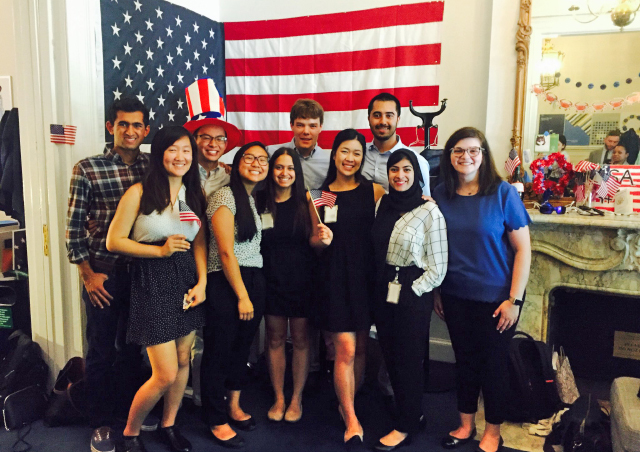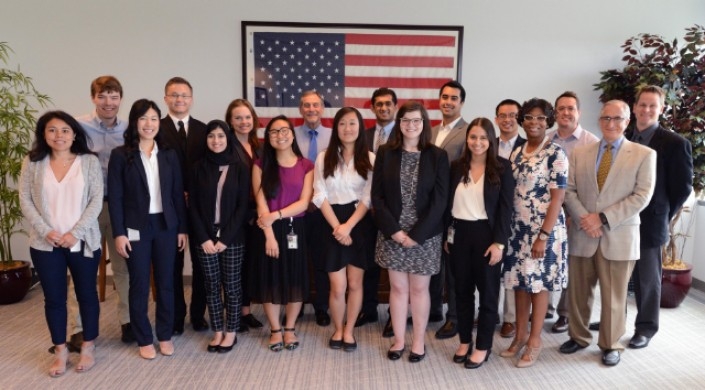News
The 2017 Civic Digital Fellows with former director of the U.S. Census Bureau John Thompson. (Photo provided by Chris Kuang.)
A group of Harvard John A. Paulson School of Engineering and Applied Sciences (SEAS) students has launched a non-profit to break down barriers that often discourage young technologists from considering social impact careers.
“A lot of my friends, while they care about public service and social good industries, didn’t find them viable career options. The better jobs, in terms of both pay and challenging projects, were ones where they felt they weren’t making a difference,” said Athena Kan, A.B. ’19, a computer science concentrator. “We wanted to create an opportunity for people who want to pursue technology for social good, but don’t think they have the option.”
The demographics of the current federal workforce bear out the need for a youthful, tech-savvy infusion; nearly one-third of government employees will be eligible for retirement within the next five years, while barely 5 percent are less than 29 years old, according to the U.S. Office of Personnel Management.
Coding it Forward began as a blog for college students, offering tips and resources to find public interest technology jobs and internships. As student interest grew, the blog morphed into a nonprofit. Shortly thereafter, the group launched the Civic Digital Fellowship, a 10-week program that brought students from across the country to Washington, D.C. to solve pressing problems at the U.S. Census Bureau.
The concept for the fellowship evolved from a class co-founders Neel Mehta, A.B. ’18, a computer science concentrator, and Kan took at the Harvard Kennedy School (HKS), “Tech and Innovation in Government,” taught by Nick Sinai, adjunct lecturer and former U.S. Deputy Chief Technology Officer. In the project-focused course, students use digital tools to help government agencies solve problems. Mehta and Kan recognized a meaningful outlet for their skills, but when Mehta began seeking a government internship, he was dismayed by the complex application process and lack of attractive opportunities.
So they decided to launch a program of their own. Sinai connected the co-founders with Jeff Meisel, Chief Marketing Officer of the Census Bureau, and they began crafting the fellowship as a fully funded model that would provide housing, travel, and stipends, as well as enrichment activities and challenging projects for a student cohort. The fellowship application went live last April and 14 students were selected, arriving in the nation’s capital in early June.
At the Census Bureau, fellows were paired with mentors and put to work on projects that fit their skills and interests. For instance, Nathaniel Burbank, S.M. ’18, a computational science and engineering student in the Institute for Applied Computational Science at SEAS, used machine learning to generate more accurate small business classifications.
The Census Bureau classifies every small business entity into one of about 1,000 categories, relying on descriptive information submitted on tax forms, Burbank explained. His team developed a machine-learning algorithm that pulled more specific information from websites and online databases, enabling more accurate classifications.
“I got firsthand experience with both the benefits and challenges of doing this kind of work within a government agency,” he said. “It was amazing to work with these incredible datasets directly, but there were many bureaucratic processes that, while well-intended, made solving certain types of technical problems more difficult than it would be within a private company.”
The fellowship also offered many opportunities for professional development, including a tour of the U.S. Capitol; site visits to the U.S. Small Business Administration, the startup incubator 1776, and the U.S. Digital Service; as well as small group mentorship with accomplished civic technologists.

The 2017 Civic Digital Fellows on a site visit to the U.S. Digital Service headquarters in Washington, D.C. (Photo provided by Chris Kuang.)
Building a community of fellows, and connecting them with other student interns in D.C., was an important aspect of the program, said Mehta.
He was product manager on a team working to streamline how people access, understand, and use Census Bureau data. Mehta collaborated with software developers, designers, and Census data experts to prototype an online platform that incorporated videos and interactive tutorials to teach individuals about the data and how to use it.
“It was rewarding to see that the things we were able to do could touch millions of lives,” he said. “Creating this platform gave the experts at the Census Bureau a megaphone to share their knowledge, and it was great to see how excited they were about the opportunity to help citizens get better information.”
Now gearing up for its second year, the expanded fellowship includes the Census Bureau, Department of Health and Human Services, Department of State, nonprofit OpenGov Foundation, and civic engagement startup Represently. The 2018 cohort is set to expand, as well, and will include between 30 and 50 students.
The fellowship serves as a win-win for students and government agencies, said co-founder Chris Kuang, A.B. ’20, an applied math concentrator. As people come to expect a higher level of technological services, federal agencies will need to recruit workers with cutting-edge tech skills and innovative mindsets.
“Look at the ease with which people interact with their iPhones or Google; they expect the same level of services from government,” Kuang said. “Who better to imagine and build these services than the next generation of technical talent? These are the people who could be working in industry, but instead feel a calling to create social and civic impact. They want to give back and they want to serve. And we’re building a talent pipeline that makes it really easy for them to do so.”
Topics: Entrepreneurship
Cutting-edge science delivered direct to your inbox.
Join the Harvard SEAS mailing list.
Press Contact
Adam Zewe | 617-496-5878 | azewe@seas.harvard.edu



